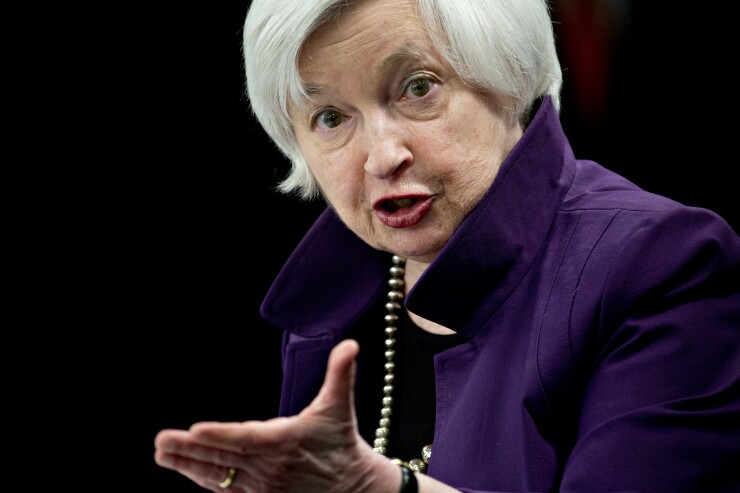(Bloomberg) --Treasury Secretary Janet Yellen warned that deregulatory efforts that watered down some post-2008 financial reforms might have gone too far and contributed to the recent banking crisis.
"These events remind us of the urgent need to complete unfinished business: to finalize post-crisis reforms, consider whether deregulation may have gone too far and repair the cracks in the regulatory perimeter that the recent shocks have revealed," Yellen said in the text of a speech she's scheduled to deliver Thursday afternoon.
Congress significantly strengthened bank oversight following the global financial crisis, but some of those rules were rolled back, especially for mid-sized banks, under former President Donald Trump. Yellen in her speech also highlighted that the Trump administration had gutted the staffing dedicated to addressing financial risk.
As the Biden administration's top economic official and regulatory wrangler, Yellen can add substantial heft to any concerted push to toughen financial rules in the aftermath of the recent U.S. bank failures. Still, while agencies like the Federal Reserve can strengthen their application of existing laws, enacting new legislation will prove difficult given the split partisan control of the House and Senate.
Yellen focused on the danger of "fire sales," where panic spurs investors to dump assets at prices below their fair value — a dynamic that can end up crippling the broader financial system and damaging the economy. She identified a number of areas where more work is needed to minimize the danger of such fire sales.
Among the targets needing attention are non-bank financial intermediaries, from money-market funds and hedge funds to digital asset providers, she said.
Additional Actions
The Fed has launched an investigation into the events that led to the collapse of Silicon Valley Bank in California and New York's Signature Bank, and Congress is likely to open its own inquiries.
Those events prompted regulators, in an effort to prevent a contagion of customer runs, to guarantee uninsured deposits at the banks, and to create an emergency lending facility to boost liquidity across the banking sector. Yellen said regulators "would be prepared to take additional actions if warranted."
While noting that she didn't want to prejudge the results of the investigations underway, Yellen said it was "important that we reexamine whether our current supervisory and regulatory regimes are adequate for the risks that banks face today."
Anticipating the arguments of those who will fight tougher rules, the Treasury chief emphasized the damage wrought by past crises to ordinary Americans.
"Regulation imposes costs on firms," she said. "But the costs of proper regulation pale in comparison to the tragic costs of financial crises."
She noted that the global financial crisis of 2008-09 led to the longest U.S. recession since World War II, cost 8 million Americans their jobs and wiped $10 trillion from the net worth of U.S. households.
Among the areas of financial vulnerability, Yellen pointed to:
- Non-banks, which are outside of or only loosely tied to deposit-taking institutions. The credit they extend has more than doubled as a share of the economy since 1985, while that for banks is relatively flat
- Money-market funds are a key component of that non-bank universe, as they provide a close substitute for deposits but aren't regulated as such.
- Open-ended funds, which offer daily redemptions but can hold illiquid assets.
- Hedge funds, where leverage is concentrated in the 25 biggest players.
- Stablecoins, a digital asset typically pegged to the US dollar.
The Treasury chief dedicated her sharpest remarks for money-market funds: "If there is any place where the vulnerabilities of the system to runs and fire sales have been clear-cut, it is money-market funds."
Money-market funds were long considered one of the safest places for households and businesses to park cash, until a run by institutional users in September 2008 played a key role in pushing global credit markets to the brink of collapse. The federal government was forced in that instance to create a massive temporary backstop for money funds. In 2020, another run in money funds prompted the Fed to create an emergency liquidity facility COVID fears gripped financial markets.
In recent weeks, however, money funds attracted significant inflows, especially to funds that invest only in U.S. Treasuries, as companies and households withdrew bank deposits.





